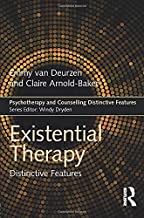
ISBN 978-1-138-68710-3, £14.99, Emmy van Deurzen and Claire Arnold-Baker
Thirty years before this tiny, yet informative offering Emmy van Deurzen produced a book entitled Existential Counselling & Psychotherapy in Practice. In it she described the attitude of the existential practitioner – one of philosophical investigation rather than medical or psychological digging. She wrote about what should be the therapist’s chief focus: the client’s mode of being (discarding techniques and strategies in favour of reflection and exploration).
The human condition and how people create and destroy truth were her concerns; the practitioner helping the client understand him/herself and ultimately initiating the process of making the implicit explicit or providing a suitable stage for the client’s struggle. Converting perceived catastrophe into a constructive experience and accepting life as demanding and challenging, yet potentially rewarding were the modus operandi, the means by which a client nudged forward.
Being overwhelmed or weary were states of mind that needed addressing and understanding rather than discounting or correcting. What is wrong or missing? were the staple questions through dialectics that shed light on the client’s situation. Pertinent issues were there to be uncovered in a meaningful manner – not rushed or doubted, or met with shock and an inadmissible face. A therapist was to display humility before anything else – “the essential characteristic of the true philosopher”.
Existential therapy’s one constant is that human beings are intrinsically free – a condition less cramped than the classic Rogerian position of us having the capacity for freedom or the ability to attain freedom with the right level of growth or actualisation. This is further expounded by Stuart Greenstreet in his majestic piece ‘On Being an Existentialist’ which appeared in the August/September 2016 issue of Philosophy Now.
Greenstreet emphasises one of existentialism’s most fundamental claims that “no objective moral order exists, independent of humanity”. He goes on to write that it is therefore futile to seek a code of behaviour outside of ourselves. We create our own value which satisfies a single governing norm known as ‘authenticity’ (being oneself).
What does this have to do with van Deurzen and Arnold-Baker’s Existential Therapy? Well, it lays the groundwork. It provides important context. It leads us to Chapter 12 of the authors’ book in which authenticity and existential guilt are discussed with reference to two of the founding fathers, Soren Kierkegaard and Martin Heidegger.
By choosing ourselves – prompted by freedom and responsibility – we experience anxiety, Heidegger asserted. But this is better than distracting ourselves, falling in with others and becoming an anonymous self. Authentic choices are often hard, but on a foundational level they satisfy us and provide oxygen to the ‘call of conscience’ within.
Existential Therapy is not van Deurzen’s most substantial contribution to this field (absent is the rigour and detail of her other works), however, it is a timely reminder in this technological age that we diminish if we allow determinism and the disapproval of others to predominate.
—
This review was first published in Private Practice, September 2019 issue, © BACP